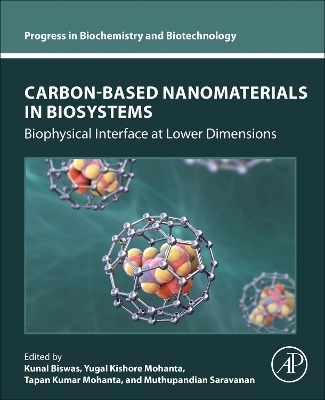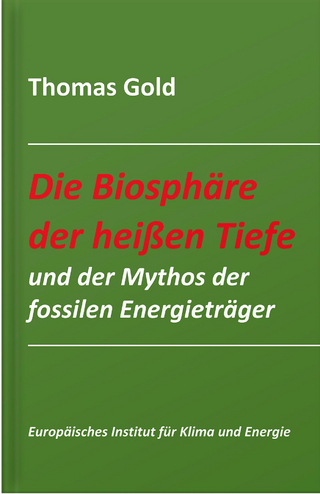
Carbon-Based Nanomaterials in Biosystems
Academic Press Inc (Verlag)
978-0-443-15508-6 (ISBN)
Dr. Kunal Biswas is currently a Scientist at the Centre for Nanoscience & Nanotechnology at the Sathyabama Institute of Science and Technology in Chennai. He received his Master’s degree in Nanoscience and Technology from the Department of Physics, Tezpur Central University, Assam, India and his PhD in Nanobiotechnology from Maulana Abul Kalam Azad University of Technology, West Benga. He has more than 8 years of research experience in Nano-Bio sciences. He has been working in the field of carbonaceous nanomaterials and its widespread applications ranging from material sciences to biotechnology. His area of research is nano-biotechnology which include material engineering, nano-bio sensors, sensor fabrication, nanotechnology, synthetic biology, the nano-bio interface, and application of machine learning (ml) and deep learning (dl) techniques in materials science and engineering. He has contributed book chapters and published in peer-reviewed SCI-indexed journals like Frontiers in Microbiology, Molecules, Nanobiotechnology, and Materials Focus. Dr. Yugal Kishore Mohanta is an Assistant Professor in the Department of Applied Biology, School of Biological Sciences at the University of Science and Technology Meghalaya (USTM). His current research is green nanoparticles and its potential application in food and biomedicine. He earned his PhD in Life Sciences from North Orissa University, Baripada. He has also successfully completed the BCIL industrial training programme on Plant Tissue Culture sponsored by the Department of Biotechnology. Among other academic/research achievements, he was awarded as visiting research scholar at Department of Biology, KU Leuven, Belgium sponsored by KU Leuven. He has more than ten years research experience on natural products chemistry and nanobiotechnology. He has published in peer-reviewed SCI-indexed journals like BMC Plant Biology, Frontiers in Microbiology, Molecules, Frontiers on Plant science, Frontiers in molecular biosciences Nanobiotechnology, and Materials Focus. He has also contributed 11 book chapters and edited a book. Dr. Tapan Kumar Mohanta is currently a Research Assistant Professor at the University of Nizwa in Oman. Before joining the University of Nizwa, Dr. Mohanta was working as a Research Professor at Yeungnam University, Gyeongsan, South Korea. Dr. Mohanta also worked as a postdoctoral research associate at the G.B. Pant University of Agriculture and Technology, Pant Nagar, India and the National Institute of Plant Genome Research, New Delhi, India. To his credit, Dr. Mohanta has more than 70 SCI/SCI-E indexed peer-reviewed research publications in Q1, Q2, and Q3 journals in the field of plant genomics, molecular biology, metabolomics, and nanomaterial science. In addition, Dr. Mohanta has contributed several book chapters and other research publications as well. Dr. Mohanta earned an MS degree in Bioinformatics and a PhD degree from the University of Turin, Italy and an MSc in Biotechnology degree from North Orissa University, India. Dr. Muthupandian Saravanan is currently a Professor in the Department of Pharmacology at Saveetha University, SIMATS, Chennai, India. He has a degree in Microbiology from Madurai Kamaraj University and a Doctorate with Specialization in Medical Microbiology and Nanomedicine from Sathyabama University, India. As a Post-Doctoral Researcher at the Hebrew University of Jerusalem, he studied nano-biomaterials and their biomedical applications. He later worked as Associate Professor, under the United Nation Development Program in Department of Medical Microbiology and Immunology at Mekelle University in Ethiopia. He has published papers in high impact journals such as the Lancet and Nature. He has participated in more than 75 national and international conferences and reviewed of more than 100 international peer-reviewed journals. He has served as guest editor/ co-editor for reputed PubMed and Scopus indexed journals. He has received many fellowships and awards, notably the IET- Nanobiotechnology premium Awards in 2019 and 2020.
Section 1: Carbon-based Nanomaterials: Fabrication, Manufacture, and Underlying Physicochemical Properties
1. Introduction to the carbon-based nanomaterials and its unique electrochemical and physico-chemical properties
2. Synthesis, characterization, and applications of carbon nanomaterials from a nanobiotechnological perspective
3. Green carbon nanomaterials and its applications in food, agriculture, and biomedicine
4. Recent trends in the bottom-up and top down techniques in the synthesis and fabrication of myriad carbonaceous nanomaterials
Section 2: Carbon Based Nanomaterials in Food Industry
5. Implications of caged molecular structure of Buckminster fullerenes in food sciences and industry applications
6. Uncovering the unique attributes of two-dimensional graphene-based nanomaterials in food safety and practices
7. Role of different types of carbon nanotubes in food sciences and food sensing applications
Section 3: Role of Carbon-Based Nanomaterials in Agriculture
8. Role of isotropic buckyball carbonaceous materials of fullerenes in crop improvement and targeted pesticide management
9. Unconventional role of 2D graphene-based nanomaterials and their composites in crop improvements and novel fertilizers applications
10. Exploring the different anisotropic chirality-based carbon nanotubes and their organic/inorganic composites in rotten crop toxin sensing, prevention and shelf-life expansion
Section 4: Role of Carbon-Based Nanomaterials in Biomedicine
11. Evaluation of zero dimensional buckyball based fullerene molecules in targeted drug delivery applications in dreaded diseases
12. Role and development of unique 2-Dimensional graphene-based nanomaterials in anti-microbial and molecular theranostic applications
13. Recent trends and practices of bio-functionalized carbon nanotubes in bio-imaging and bio-sensing applications in biomedical sectors
14. Combating ‘diseases’, employing different forms of carbonaceous nanomaterials via ‘theranostic’ applications in clinical and biomedical sectors
Section 5: Carbon Nanomaterials-based Biosensors/Devices for Food, Agriculture and Biomedicines
15. Potentialities of zero-dimensional Fullerenes in designing bio-sensing modalities in crop, food toxin and biomedicines
16. Role of fabricated anisotropic graphene and nanotubes based electro-chemical sensors for food, crop damage surveillance and management
17. Unveiling the potential activities of myriad carbonaceous nanomaterials in scaling and fabrication of miniaturized, sensitive, and economical medical diagnostic kits
18. Role of different approaches of functionalization over carbonaceous nanomaterials in designing different sensor devices in food, crop, and biomedical sectors
Section 6: Toxicity assessment of different forms of Carbon-Based Nanomaterials: Safety, Health Evaluation (SHE)
19. Toxicological analysis of carbon-based nanomaterials in food industry applications
20. Risks associated with the clinical trials of carbon nanomaterials in agriculture domains (Soil nutrients/ Soil microbial diversity)
21. Safety matters pertaining to carbon-based nanomaterials in drug designing for targeted drug delivery in biomedical sciences
| Erscheinungsdatum | 27.03.2024 |
|---|---|
| Reihe/Serie | Progress in Biochemistry and Biotechnology |
| Verlagsort | San Diego |
| Sprache | englisch |
| Maße | 191 x 235 mm |
| Gewicht | 1350 g |
| Themenwelt | Naturwissenschaften ► Biologie ► Biochemie |
| Naturwissenschaften ► Physik / Astronomie ► Angewandte Physik | |
| Technik ► Umwelttechnik / Biotechnologie | |
| ISBN-10 | 0-443-15508-9 / 0443155089 |
| ISBN-13 | 978-0-443-15508-6 / 9780443155086 |
| Zustand | Neuware |
| Informationen gemäß Produktsicherheitsverordnung (GPSR) | |
| Haben Sie eine Frage zum Produkt? |
aus dem Bereich


